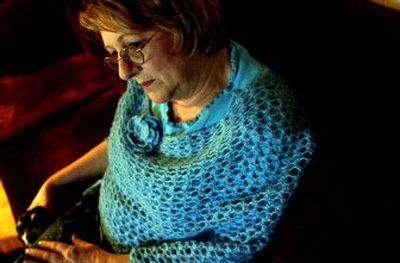Help for when addiction hits home

At first, Judy Reid didn’t know what was wrong.
The North Idaho woman couldn’t understand why her son and his wife were always out of money, why the house was always a wreck, why their three children were always sick – or scared.
She didn’t know why the pair fought all the time or why young parents would ignore their 3-year-old son’s birthday party.
Then the needles showed up in their bedroom. Suddenly, Reid understood what the trouble was: methamphetamine.
For more than a year, Reid has struggled with the knowledge that her 31-year-old son and his 23-year-old wife are meth addicts. She has watched as the powerful stimulant ravaged their personalities, eroded their judgment and cost them their children. She has cried as her grandchildren revealed the awful fallout from their parents’ habit.
“They had been locking them in the closet,” Reid said quietly, sitting on the couch of her tidy manufactured home. “You just get past one heartbreak, and then you have another.”
Now, the 57-year-old grandmother of eight is taking steps to ensure that other families don’t suffer that same heartbreak alone. She is organizing a North Idaho chapter of Mothers Against Methamphetamine, a national nonprofit agency that provides information and faith-based support to relatives and friends of addicts.
Through the Alabama-based group, known as MAMa, Reid hopes to raise awareness about the drug officials say is responsible for more than half of the court cases filed in Kootenai County each year and more than a quarter of foster care placements.
“It’s beyond a plague,” said Reid, who works as a business manager at a local medical office.
Methamphetamine is a greater problem in North Idaho than in other parts of the state, according to Idaho State Police figures. Kootenai County alone accounted for 234 of the 750 labs seized statewide between 1999 and 2004, police statistics showed.
Societal fallout
More drugs create more problems, law enforcement and child custody workers agreed.
Of the 1,500 felony charges filed in Kootenai County in 2005, more than half were directly or indirectly tied to methamphetamine, said Bill Douglas, county prosecutor.
Of the 380 children now in protective custody in the county, about half were removed for causes related to alcohol or substance abuse, said Randy Geib, local program manager for Idaho’s Child Protection Services department. About 30 percent of those cases involved meth. That includes about a dozen babies a month born at Kootenai Medical Center with methamphetamine in their blood. For the drug to be detected, their mothers must have ingested the substance within 72 hours of delivery, Geib noted.
“Methamphetamine is a big problem for us,” he said. “These families are usually in no state of mind or condition to participate with us around corrective actions or plans that will allow their children to go home.”
Systems of support
Understanding methamphetamine addicts’ state of mind will be a focus of the new group – and a similar support system begun by Kandice James-Calkins, a mother of three in Orofino. In each area, the women plan to hold public meetings, create channels of information and provide private support for families struggling with meth.
Both women want parents, friends and family members to know what they’ve learned the hard way: that methamphetamine is a highly addictive substance that fundamentally – and sometimes permanently – alters the brain chemistry of those who use it.
“At first, you believe they should be able to do something about it,” Reid said. “You think, ‘Maybe if I can just talk to him one more time.’ ”
That’s a mistake, said Mary Holley, the Alabama physician who started Mothers Against Methamphetamine after her brother, a meth addict, committed suicide.
“You can’t talk to these kids,” she said in a telephone interview Monday. “They won’t stop just because you want them to.”
Holley advocates a “tough love” approach that exhorts families to withhold money, shelter, contact and other care so that users can experience the consequences of their addiction, no matter how bad.
More than other substances, including alcohol, marijuana and even cocaine, meth causes both immediate and lasting alterations in basic brain function, according to the Office of National Drug Control Policy. Recovering from meth addiction can take up to two years, experts said.
In the meantime, people living with addicts often are forced to cope with behaviors that include lying, stealing, crime and violence.
“You can spend 12 to 18 months waiting for the anxiety to lift, for the depression to lift, for the nightmares to go away,” Holley said.
For members of MAMa support groups, which now include about 150 chapters across the United States, the answer to meth addiction is Christianity. The national and local chapters are faith-based, organizers said.
“I teach people how the power of Jesus Christ can heal them. I don’t apologize to anyone for that,” Holley said. “I’ve talked to people who say any higher power will do it, but I don’t agree.”
For Reid, creating a local chapter of MAMa is helping her gain some control over her family’s crisis. The children of her son and his wife are now living with relatives in three different homes. The couple is now living in Medical Lake with a relative, who said Monday he thinks they have been sober and soon will enter drug treatment.
Reid is hopeful but skeptical.
“Methamphetamine users are the best liars there ever was,” she said. “The situation is very, very hopeless. We are really trying to hang on by a very fine little thread.”
For more information, e-mail Judy Reid at jreid66@msn.com.